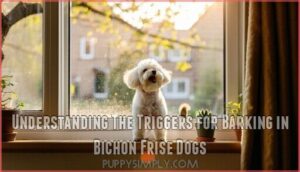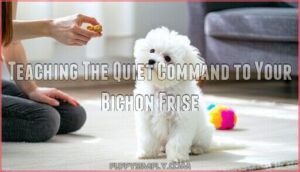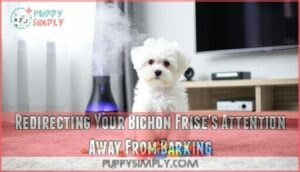This site is supported by our readers. We may earn a commission, at no cost to you, if you purchase through links.

Up to 45% of Bichons experience separation anxiety, which doubles their barking when left alone. They’ll also vocalize for attention, out of boredom, or when strangers approach.
Their breeding as companion dogs makes them excellent watchdogs but challenging for noise-sensitive households. While you can’t eliminate their vocal tendencies entirely, understanding their specific triggers and implementing the right training techniques can substantially reduce excessive barking and create a more peaceful home environment.
Table Of Contents
- Key Takeaways
- Why Do Bichon Frise Dogs Bark Excessively?
- Understanding The Triggers for Barking in Bichon Frise Dogs
- Desensitizing Your Bichon Frise to Barking Triggers
- Using Counter-Conditioning Techniques to Reduce Barking
- Positive Reinforcement Training for Bichon Frise Dogs
- Teaching The Quiet Command to Your Bichon Frise
- Redirecting Your Bichon Frise’s Attention Away From Barking
- Providing Sufficient Exercise and Mental Stimulation for Bichon Frise Dogs
- Creating a Calm Environment for Your Bichon Frise
- Managing Your Bichon Frise’s Environment to Minimize Barking
- Frequently Asked Questions (FAQs)
- Do Bichon Frise bark a lot?
- Can a Bichon Frise yell at a barking dog?
- How do you train a Bichon Frise to stop barking?
- Why does my Bichon Frise bark a lot?
- When do Bichon Frises start barking?
- Is a Bichon Frise a quiet dog?
- Are bichon frise dogs good for apartment living?
- What are the grooming requirements for bichon frise dogs?
- What are the health problems that bichon frise dogs are prone to?
- How much does it cost to own a bichon frise dog?
- Conclusion
Key Takeaways
- Yes, Bichon Frises bark more than most breeds – they’re naturally chatty companions with alert instincts, and up to 45% experience separation anxiety that doubles their barking when you’re away.
- You can identify and address their specific triggers – separation anxiety, attention-seeking, boredom, and fear are the main causes, so understanding what sets your dog off helps you target the right solutions.
- Training works, but requires consistency from everyone – teach the "quiet" command, use positive reinforcement immediately when they’re silent, and make sure all family members follow the same approach to avoid mixed messages.
- Environmental management and exercise reduce barking significantly – provide 30-60 minutes of daily activity, create calm spaces with sound masking, and use mental stimulation like puzzle toys to prevent boredom-driven vocalizations.
Why Do Bichon Frise Dogs Bark Excessively?
Understanding your Bichon Frise’s barking patterns requires examining both their breed history and individual triggers. These fluffy companions weren’t originally bred as guard dogs, yet their alert nature and genetic predisposition make them naturally vocal communicators.
Separation anxiety tops the list of excessive barking causes. Your Bichon’s emotional state becomes distressed when you’re away because they’re hardwired for companionship. This isn’t just puppy development behavior—it’s deeply ingrained in their DNA.
Attention seeking represents another major factor. Your clever pup quickly learns that barking equals human interaction, even if it’s negative attention. They’re basically using communication signals to say, "Hey, notice me!"
Boredom or lack of stimulation creates frustrated energy that needs an outlet. Without proper mental engagement, your Bichon Frise barking becomes their entertainment system. Think of it as their way of channel surfing when there’s nothing interesting on their mental television.
Understanding The Triggers for Barking in Bichon Frise Dogs
Understanding what triggers your Bichon Frise’s barking is the first step toward managing this common behavior problem.
Your fluffy companion doesn’t bark just to annoy you—there are specific reasons behind their vocal outbursts that you can identify and address.
Separation Anxiety
Your Bichon might bark excessively when left alone due to separation anxiety, affecting up to 45% of the breed. This emotional distress doubles their baseline barking rate and can persist for months without intervention.
Nearly half of Bichon Frises struggle with separation anxiety, doubling their barking when you’re away
Key signs of separation-related barking include:
- Crate Comfort issues – whining and scratching at confinement areas
- Routine Changes reactions – increased vocalization after schedule disruptions
- Gradual Departure responses – barking that peaks within the first hour of your absence
Effective Separation Anxiety management involves Alone Time Training with structured departures and Calming Aids like puzzle toys, reducing anxious episodes by 46%.
Fear or Anxiety
Fear-driven anxiety triggers can turn your gentle Bichon into a vocal alarm system. Common culprits include strangers approaching, loud noises, and unfamiliar environments. Over 30% of Bichon owners report anxiety-related barking, with noise phobias affecting 68% of anxious dogs. Creating safe spaces and using calming techniques help manage these responses.
- Your dog’s trembling and barking during thunderstorms breaks your heart
- Watching them cower from strangers makes you feel helpless
- Their fear-filled eyes during vet visits create lasting guilt, which can be addressed by using calming techniques
Attention Seeking
Beyond anxiety, your Bichon might bark simply because it works—you respond! These smart pups quickly learn that barking gets them what they want: your attention.
Breaking this attention seeking behavior requires ignoring barking completely while rewarding silence with praise and treats. Consistent response from all family members prevents mixed messages that reinforce Bichon Frise barking patterns.
Desensitizing Your Bichon Frise to Barking Triggers
Desensitization transforms your Bichon’s fear into confidence through Gradual Exposure to triggers. Start by creating a Safe Space where your dog feels secure, then slowly introduce Environmental triggers at manageable distances. You can find products to help with Bichon desensitization training.
- Identify specific triggers – doorbell sounds, Visual Stimuli like strangers, or Sound Sensitivity to traffic
- Practice controlled exposure – present triggers briefly at low intensity in a calm environment
- Use distraction techniques – redirect focus with treats when Emotional triggers appear, building positive associations gradually
Using Counter-Conditioning Techniques to Reduce Barking
Counter-conditioning transforms your Bichon’s emotional responses to barking triggers by pairing stimuli with high-value rewards. When your dog notices the doorbell or stranger, immediately offer treats before they bark. This systematic desensitization changes fear into anticipation of good things.
Perfect reward timing is vital—deliver treats the instant they see the trigger. With consistent generalization training, your Bichon learns that former threats now predict delicious rewards.
It’s important to maintain a controlled training environment to avoid overwhelming your dog, using systematic desensitization.
Positive Reinforcement Training for Bichon Frise Dogs
Positive reinforcement training transforms your Bichon Frise’s barking habits through strategic reward timing and treat selection. When your dog stays quiet, immediately offer high-value treats and praise to reinforce calm behavior. Consistency importance can’t be overstated—every family member must follow the same approach.
Clicker training helps mark exact moments of silence, making shaping behavior more precise. Many owners find success with consistent clicker use during these sessions. Through dedicated socialization and positive reinforcement training, your Bichon Frise learns that quiet moments bring rewards, which is achieved by maximizing readability of the training process.
Teaching The Quiet Command to Your Bichon Frise
Successfully teaching your Bichon Frise the quiet command requires patience and Command Consistency. This training technique transforms your chatty companion into a well-behaved pup who knows when it’s time to zip it. The key lies in perfect Reward Timing – catch that moment of silence immediately after they stop barking to reinforce the behavior.
Here’s your step-by-step approach to mastering this essential skill:
- Start with the "speak" command first – teach them to bark on cue so you can control when they start and stop
- Use clear Hand Signals alongside verbal commands – a flat palm gesture works well for "quiet"
- Practice Generalization Training in different locations – kitchen, backyard, front door scenarios
- Implement Proofing Behavior with distractions – practice while doorbell rings or visitors arrive
- Maintain short 5-minute training sessions – Bichon Frise barking attention spans require bite-sized lessons
Positive reinforcement training works best when you reward immediately after they quiet down, creating strong associations between silence and treats. You can also use a training clicker effectively to mark the desired behavior.
Redirecting Your Bichon Frise’s Attention Away From Barking
When barking starts, quickly shift your Bichon’s focus to break the cycle. This redirection technique works best with consistent training and positive reinforcement.
- Toy Distraction: Offer puzzle engagement toys or chew items to occupy their mind
- Calming Scents: Use lavender or chamomile to promote relaxation during training sessions
- Sound Masking: Play soft music to encourage alternative behaviors instead of reactive barking
The key is timing—redirect attention the moment you notice tension building, not after barking begins.
Providing Sufficient Exercise and Mental Stimulation for Bichon Frise Dogs
Beyond just redirecting attention, your Bichon Frise needs proper exercise and mental stimulation to curb excessive barking. These energetic dogs require 30-60 minutes of daily activities, including walks, Training Frequency sessions, and Puzzle Toys. Exercise Variety keeps them engaged—try Indoor Activities like hide-and-seek or Socialization Games with other dogs.
Mental stimulation through interactive toys and new experiences prevents boredom-driven barking. A tired Bichon Frise is typically a quiet one, making consistent activities your secret weapon against vocal outbursts. Addressing unmet needs such as mental and physical activity can substantially reduce excessive barking. For more information, visit mental and physical activity, which highlights the importance of daily activities and Indoor Activities in managing barking, ultimately leading to a more balanced approach to Bichon Frise care.
Creating a Calm Environment for Your Bichon Frise
While environmental stressors can trigger excessive barking, establishing a Calm Environment helps your Bichon feel secure. Creating this Safe Space reduces anxiety-driven vocalizations through simple adjustments.
- Sound Masking: White noise or soft music drowns out Environmental Triggers
- Calming Scents: Lavender or chamomile creates a peaceful atmosphere
- Consistent Routine: Predictable schedules reduce stress and uncertainty
- Owner Calmness: Your relaxed energy directly influences your dog’s behavior
Managing Your Bichon Frise’s Environment to Minimize Barking
Creating a strategic environment helps prevent triggers before they spark unwanted vocalizations. Think of it as building your dog’s personal fortress of calm, where consistent routine and thoughtful preparation work together seamlessly.
This means avoiding triggers that cause your dog to bark, such as:
- Loud noises
- People coming and going
You can also provide your dog with calming music, toys, treats, and supplements to help them relax.
Consider these powerful environment modifications:
- Soundproofing home areas and using visual barriers creates that essential safe space your Bichon craves
- Calming scents paired with distraction techniques transform potentially stressful moments into peaceful ones
Frequently Asked Questions (FAQs)
Do Bichon Frise bark a lot?
Yes, Bichon Frises can bark excessively.
They’re naturally alert dogs who’ll bark at visitors, noises, and changes around them.
With proper training and socialization, you can manage their vocal tendencies effectively.
Can a Bichon Frise yell at a barking dog?
Imagine your gentle Bichon suddenly releasing a fierce vocal assault – it’s absolutely possible!
Your fluffy companion can definitely "yell" at barking dogs through intense, sustained barking that’s surprisingly loud for their size.
How do you train a Bichon Frise to stop barking?
Start early with consistent training using positive reinforcement. Teach "quiet" commands, ignore attention-seeking barks, provide mental stimulation, and address triggers like boredom or separation anxiety through exercise and socialization.
Why does my Bichon Frise bark a lot?
Like a tiny alarm system with fluffy fur, your Bichon barks because they’re naturally alert dogs.
They also bark because they crave attention, feel anxious when alone, or react to unfamiliar sounds and people around them.
When do Bichon Frises start barking?
Bichon Frises typically start barking around 8-12 weeks old when they’re puppies. You’ll notice they become more vocal as they grow and develop their alert instincts, especially during socialization periods.
Is a Bichon Frise a quiet dog?
Most breed surveys show Bichon Frises bark more than retrievers but less than terriers.
No, they’re not quiet dogs – you’ll hear their high-pitched alerts when visitors arrive or unfamiliar sounds occur, which can be considered as high-pitched alerts.
Are bichon frise dogs good for apartment living?
You’ll find these fluffy companions adapt well to apartment life, but their barking tendencies can challenge thin walls.
They’re compact, don’t need huge yards, yet require daily exercise and mental stimulation to prevent restless behavior.
What are the grooming requirements for bichon frise dogs?
You’ll need professional grooming every 4-6 weeks since their fluffy coat grows continuously. Daily brushing prevents matting, while monthly baths keep them looking pristine and smelling fresh.
What are the health problems that bichon frise dogs are prone to?
You’ll encounter health issues in these fluffy companions. Watch for dental problems, cataracts, bladder stones, allergies, Cushing’s disease, diabetes, and hip dysplasia as potential concerns.
How much does it cost to own a bichon frise dog?
You’ll spend around $1,500-$3,000 annually on a Bichon Frise, while a purebred puppy costs $500-$2,000 upfront.
Regular grooming every six weeks adds up quickly, but their loving companionship makes every penny worthwhile.
Conclusion
Rome wasn’t built in a day, and neither is a quiet Bichon Frise. While these fluffy companions naturally bark more than other breeds, you can definitely reduce excessive vocalization with patience and consistency. The key is understanding their triggers—separation anxiety, attention-seeking, and alertness—then addressing them through proper training, exercise, and environmental management.
Remember, you’re working with their companion dog instincts, not against them. With the right approach, you’ll discover that Bichon Frise dogs don’t have to bark excessively to be happy, devoted family members, and this can be achieved by applying proper training.
- https://vcahospitals.com/know-your-pet/introduction-to-desensitization-and-counterconditioning
- https://thevets.com/resources/pet-training/stop-dog-from-barking/
- https://www.rover.com/blog/dog-training-using-desensitization-and-counter-conditioning/
- https://www.sciencedirect.com/science/article/abs/pii/S1558787824000820
- https://www.instinctdogtraining.com/counterconditioning-desensitization/













